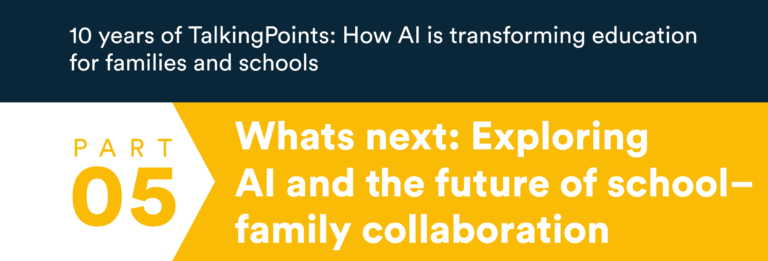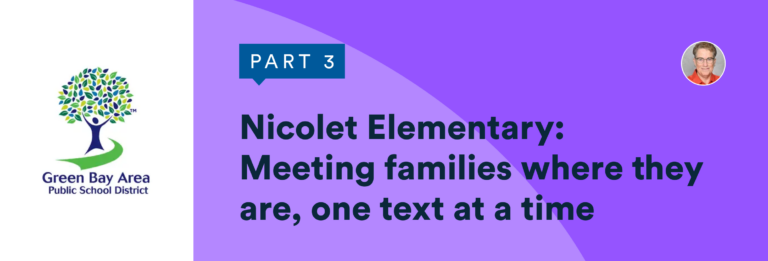Written by TalkingPoints
Strong parent-teacher partnerships are key to supporting students’ success in the classroom. When teachers and parents are in regular communication about students’ needs, progress and successes, students feel supported, motivated to try their best and do significantly better in school. A study by Westat and Policy Studies Associates for the U.S. Department of Education has shown strong parent engagement leads to improved student outcomes, with low-performing students benefiting the most. Research has shown parent engagement is linked to higher academic performance, grades, attendance and scores on math and reading assessments. However, teachers find it challenging to build strong partnerships with parents, mainly due to language, technological and perception barriers and miss the opportunity to elevate student success (Gates Foundation). TalkingPoints bridges this gap through a parent engagement platform with translation.
With the support of NewSchools Venture Fund, we partnered with WestEd to measure our impact on building strong parent-teacher partnerships and increasing parent engagement, especially for immigrant, low-income families of color. The participating schools in our study have high ELL and FRL student populations. 80% of the students were non-white and the teachers were English-only speakers. This is representative of the changing student demographics in the U.S., while teacher demographics continue to remain the same. Over 80% of public school teachers in the United States are white, middle class, and female, while there are 10 million low-income, diverse, immigrant and often non-English speaking students (this will grow to 20 million by 2030).
We are excited to share the evidence demonstrating that TalkingPoints helps parents and teachers partner for student success.
1. TalkingPoints helps parents be more involved in their child’s education and this improvement is more pronounced for non-white, non-English speaking parents.
87% of parents are more involved in their child’s education and having more conversations about school with their child, since engaging with teachers through TalkingPoints. This was especially the case for non-English speaking families, with 100% of non-English speaking families being more involved in their child’s education. This is consistent with the findings from our impact study last school year where 85% of parents experienced similar changes in behavior after engaging with their child’s teacher through TalkingPoints. Click here for the 2016-2017 impact report.
87% of parents are more involved in their child’s education through TalkingPoints

Specifically, non-English speaking parents described why TalkingPoints helped them engage more. One parent said she believed her relationship with the teacher changed, “because I am more connected to what is happening at school. Especially what they are doing in the curriculum and teaching, and how my son and other children develop.” Another parent said she felt more empowered “because I know what is happening with my daughter’s education” and that [TalkingPoints] was “the most spectacular thing that anyone could have asked to be created.”
Last year, we also learned through parent focus groups and interviews that TalkingPoints was getting rid of language barriers that were keeping parents who wanted to be involved in school on the sidelines. The WestEd study provides evidence demonstrating that TalkingPoints is making the most significant difference in involving non-English speaking families in their child’s education. After TalkingPoints, 100% of non-English speaking families were more involved in their child’s education, and also more comfortable communicating with the teacher.
2. TalkingPoints helps teachers meaningfully engage all families, regardless of language barriers.
TalkingPoints helps teachers provide all parents with the same information in a language they understand and equal opportunities to be involved in their children’s education. In low-income, immigrant communities, parent engagement is lower by as much as 50% due to language, technological and socioeconomic barriers. Teachers who participated in the study were able to engage with their non-English speaking parents more and saw the difference this had on their relationship and involvement in school. By being able to directly communicate with parents instead of having to go through a bilingual staff member, teachers were able to communicate with non-English parents in a way they hadn’t been able to before.
TalkingPoints not only helped increase the frequency of communication with all parents, it also changed the types of information sent home. Teachers sent more messages about students’ progress in class, both positive and constructive, and shared any concerns they had right away. Parents were more responsive through text messages and showed appreciation for teachers’ efforts to reach out to them. As student demographics change rapidly across the country, TalkingPoints provides a way for teachers to engage a diverse group of parents in supporting their children’s learning and success in school.
3. TalkingPoints Next Steps
TalkingPoints is creating strong parent-teacher partnerships, regardless of the languages parents speak. We want to deepen our impact by building teacher and parent capacity to work together to provide students with the support they need to excel in the classroom and beyond. We will be partnering with district and school leaders to:
- Provide additional scaffolding and personalized coaching for new teachers on building meaningful parent engagement based on evidence-based practices
- Support teacher collaboration and sharing of best practices around parent engagement within the app
- Offer culturally sensitive coaching for parents on initiating conversations with teachers and advocating for their child’s needs
If you’d like to read the full version of the WestEd Study Report, please send us an email requesting it at hello@talkingpts.org.



